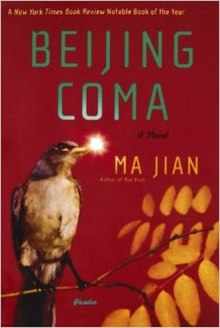Beijing Coma
 | |
| Author | Ma Jian |
|---|---|
| Translator | Flora Drew |
| Language | Chinese |
| Publisher | Farrar, Straus and Giroux |
| Publication place | United States |
Published in English | May 27, 2008 |
| Media type | |
| Pages | 592 ppg |
| ISBN | 0374110174 |
Beijing Coma is a 2008 novel by Ma Jian. It was translated from Chinese by Flora Drew.[1] The Chinese government has since banned the book.[2] Ma has stated that he wrote the book "to reclaim history from a totalitarian government whose role is to erase it" and named the novel Beijing Coma in reference to this.[3][4] Beijing Coma was nominated in 2009 for the Man Booker Prize and is one of The New York Times "100 Notable Books of 2008".[5][6]
Synopsis
The book follows the character of Dai Wei, a man who awakens from a coma to discover that ten years have passed since he was shot in Tiananmen Square on June 4, 1989. The book's narrative switches between Dai Wei's time as a seemingly non-responsive coma patient to his life before his shooting.
Reception
Critical reception for the book was positive,[7][8][9] with Tash Aw calling it "a landmark".[10] Pankaj Mishra compared Beijing Coma with the work of writers such as Milan Kundera, Josef Škvorecký and Ivan Klíma.[1] Michiko Kakutani praised the novel's translation while stating that the book "is desperately in need of editing".[11]
Controversy
In April 2012 Ma protested the choice of China as the guest of honor at the London Book Fair.[12] Ma used red paint to smear a cross over his face and attempted to present a copy of Beijing Coma to Liu Binjie, but was stopped by security. Ma called his Chinese publisher a "mouthpiece of the Chinese communist party" and claimed that he had been manhandled while trying to give Liu his book.[13]
References
- ^ a b Mishra, Pankaj (30 June 2008). "Tiananmen's Wake: A novel of hope and cynicism". The New Yorker. Condé Nast Publications. Retrieved 30 June 2008.
- ^ Smallwood, Christine (May 25, 2008). "Cage of bones". Los Angeles Times. Retrieved 1 September 2012.
- ^ Stone, Beth. "Beijing Coma". Socialist Review. Retrieved 1 September 2012.
- ^ "Tiananmen remembered". BBC News. 4 June 2009. Retrieved 1 September 2012.
- ^ "German Book Fair Head Defends Choice Of China". CBS News. Retrieved 1 September 2012.
- ^ "100 notable books of 2008". The New York Times. December 4, 2008. Retrieved 1 September 2012.
- ^ Lasdun, James (2 May 2008). "Children of the revolution". The Guardian. Retrieved 1 September 2012.
- ^ Row, Jess (July 13, 2008). "Circling the Square". The New York Times. Retrieved 1 September 2012.
- ^ Cheuse, Alan (June 29, 2008). "'Beijing Coma' fuses China's past, present". SF Gate. Retrieved 1 September 2012.
- ^ Aw, Tash (26 Apr 2008). "A story of Tiananmen Square". Telegraph. Retrieved 1 September 2012.
- ^ Kakutani, Michiko (July 4, 2008). "A Broken Body in Shiny, New China". The New York Times. Retrieved 1 September 2012.
- ^ Lane, Victoria (17 Apr 2012). "A Letter from China". Telegraph. Retrieved 1 September 2012.
- ^ Page, Benedicte (19 April 2012). "Ma Jian protest paints the London Book Fair red". The Guardian. Guardian Media Group. Retrieved 19 April 2012.
